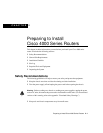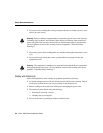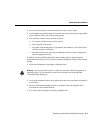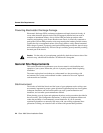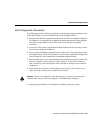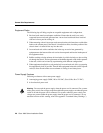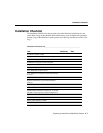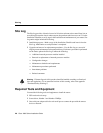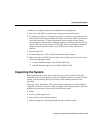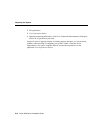
2-4 Cisco 4000 Series Installation Guide
General Site Requirements
Preventing Electrostatic Discharge Damage
Electrostatic discharge (ESD) can damage equipment and impair electrical circuitry. It
occurs when electronic printed circuit cards are improperly handled and can result in
complete or intermittent failures. Always follow ESD prevention procedures when
removing and replacing cards. Ensure that the router chassis is electrically connected to
earth ground. Wear an ESD-preventivewrist strap, ensuringthat it makes good skincontact.
Connect the clip to an unpainted surface of the chassis frame to safely channel unwanted
ESD voltages to ground. Toproperly guard against ESD damage and shocks,the wrist strap
and cord must operate effectively. If no wrist strap is available, ground yourself by touching
the metal part of the chassis.
Caution For the safety of your equipment, periodically check the resistance value of the
antistatic strap, which should be between 750 kilohm and 10 megohm.
General Site Requirements
This section describes the requirements your site must meet for safe installation and
operation of your system. Ensure that your site is properly prepared before beginning
installation.
The router can be placed on a desktop or rack-mounted in a data processing or lab
environment. The system can be mounted in either a standard or telco rack. Optional
rack-mount kits are available.
Site Environment
The location of individual chassis and the layout of your equipment rack or wiring room
are extremely important for proper system operation. Equipment placed too close together,
inadequate ventilation, and inaccessible panels can cause system malfunctions and
shutdowns, and can make system maintenance difficult.
When planning your site layout and equipment locations, use the precautions described in
the next section, “Site Configuration Precautions,” to help avoid equipment failures and
reduce the possibility of environmentally caused shutdowns. If you are currently
experiencing shutdowns or unusually high errors with your existing equipment, these
precautions will help you isolate the cause of failures and prevent future problems.



